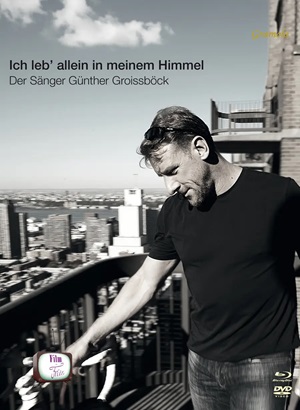
I live alone in my Heaven
The singer Günther Groissböck (bass)
Documentary film written and directed by Astrid Bischer
Filmed 2021-22, New York, Amsterdam, Vienna, Garmisch-Partenkirchen, Prague and Switzerland
Includes brief performance and rehearsal extracts from Don Carlo and Aida (Verdi), Parsifal and Die Walküre (Wagner), Der Freischütz (Weber), Der Rosenkavalier (Strauss), Rusalka (Dvořák)
Gramola GRAM20005 DVD and Blu-ray [65]
Artist documentaries can be very hit-and-miss. The worst are cut-and-paste trawls through the company’s archive with a collage of clips that doesn’t really say much, while the best contain revelations that deepen your understanding of the performer. This one doesn’t do either of those, but falls more towards the quality end and provides an interesting insight into Günther Groissböck’s world.
It doesn’t have a thesis to prove or to explore, so it’s unavoidably pretty scattergun. We see Groissböck in lots of places singing lots of roles: Ramfis (Aida) in Verona, Philip II (Don Carlo) in New York, Ochs (Rosenkavalier) in Vienna, the Water Goblin (Rusalka) in Prague, and several others. Often they are no more than clips for a few minutes, and you’ll learn next to nothing about his take on what it’s like to sing Verdi or Weber. There are a few neat insights, though. We get to eavesdrop on the Rosenkavalier rehearsal process, and we hear conductor Philippe Jordan speak about why he so enjoys working with Groissböck. Groissböck also speaks candidly about why he walked away from the role of Wotan in Bayreuth at the last possible minute, though he doesn’t go too deeply into it.
Sometimes the film is so flattering that it comes close to hero worship. When Groissböck first strides onto the camera it’s to the surging finale of Bruckner’s Eighth Symphony. We get uncomfortably close shots of him running and cycling in New York’s Central Park, as also some surging scenes of him hillwalking in the Austrian Alps. These are all a bit naff. The film is far more interesting when we see him at work, including in some areas you might not expect. We see him directing a chamber performance of Tristan und Isolde in Vienna, for example. It’s touching – if ultimately not particularly enlightening – to see him being shown around Richard Strauss’s villa in Garmisch-Partenkirchen in preparation for recording some of the songs.
The one thing the film made me pursue was a concert of Parsifal extracts that Groissböck performed in Vienna’s empty Stephansdon during lockdown. It’s available here and it’s fascinating to hear Groissböck singing Gurnemanz from the pulpit to the accompaniment of the organ, a reminder of the pandemic that I wouldn’t have encountered were it not for this film.
It’s also fascinating to see how other people talk about Groissböck, always positively, thought that’s hardly surprising given the context. The most famous of these is a fulsome Anna Netrebko, but his daughter also talks about how she tells him whether he has done well after a performance. There’s a sweet sequence where the cast of the Prague National Theatre present him with a birthday cake during the curtain calls for Rusalka.
Are there any revelations? Not really, and the overall tone is saccharine and a bit cheesy. The worst example is on the morning of Groissböck’s birthday when the interview asks him “What does your birthday mean to you?” Hardly forensic, and rather in keeping with the rest of the film. However, it’s a diverting hour that contains some interesting insights into his performing life. And, of course, there’s always that voice: rich, commanding, deep, always lyrically beautiful. There’s plenty of that, and if you’re a fan, then you’ll love spending an hour with it like this.
The package, by the way, contains both a DVD and a BD: the content is the same but you can choose how you watch it. The language is overwhelmingly in German, but the subtitles are clear and easy to follow, and you can view all the menus in English.
Simon Thompson
Buying this recording via a link below generates revenue for MWI and helps us keep free access to the site



Video details:
NTSC DVD and Blu-ray disc
16:9 anamorphic
Audio format: LPCM 2.0
Region code 0
German with English subtitles
Film directed by Astrid Bischer
















